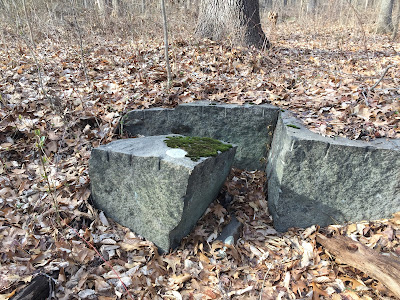This year we've set out to improve the trails at Autumn Hill Reservation. The Friends of Herrontown Woods has used a similar approach at Herrontown Woods with success.
The aim is to reroute a few of the trails to minimize muddiness and highlight some of the features that would otherwise go unseen, such as these four big boulders that got lifted up into the air by a tree's rootball as it fell.The fishhook-shaped thorns on multiflora rose punish anyone who thinks they can overcome this formidable, sprawling shrub with brute force. It takes a patient, even gentle approach to navigate through all the thorny branches to cut the shrub at the base. Even then, the thorns prove unavoidable. Anyone who forgets their work gloves will pay.
There's a payoff, though, for all the hard work of cutting through fallen trees and clearing invasive shrubs. Mixed in with the invasives are some native spicebush, high bush blueberry, and flowering dogwood. It's satisfying to rescue these from the burden of invasive overgrowth.
A few more work sessions and visitors to Autumn Hill will be able to better experience the preserve's historical and natural features while walking on drier ground.





